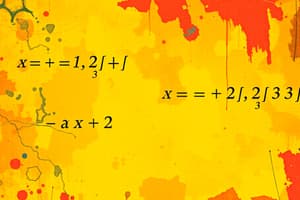Podcast
Questions and Answers
What is an Algebraic Proof?
What is an Algebraic Proof?
- A statement that is accepted as true
- A system of reasoning that uses facts
- A proof made up of a series of algebraic statements (correct)
- An example used to show that a statement is not always true
What is an axiom?
What is an axiom?
A statement that is accepted as true.
What is a conclusion in a conditional statement?
What is a conclusion in a conditional statement?
The statement that follows the word then.
What defines a conditional statement?
What defines a conditional statement?
What is a conjecture?
What is a conjecture?
What is a contrapositive?
What is a contrapositive?
What is a converse?
What is a converse?
What is a counterexample?
What is a counterexample?
What is deductive reasoning?
What is deductive reasoning?
What is a hypothesis in a conditional statement?
What is a hypothesis in a conditional statement?
What is an if-then statement?
What is an if-then statement?
What is inductive reasoning?
What is inductive reasoning?
What is an inverse?
What is an inverse?
What is a postulate?
What is a postulate?
What is a proof?
What is a proof?
What are related conditionals?
What are related conditionals?
What is a statement in logic?
What is a statement in logic?
What is a theorem?
What is a theorem?
What are two-column proofs?
What are two-column proofs?
Flashcards are hidden until you start studying
Study Notes
Algebraic Proof Definitions
- Algebraic proof consists of a series of algebraic statements justified by the properties of equality.
- Axiom represents a universally accepted truth without proof.
- Conclusion is the result of a conditional statement following the word "then."
- Conditional statement can be expressed in the structure "if-then," establishing a cause-and-effect relationship.
Key Concepts in Proofs
- Conjecture is an educated guess derived from existing knowledge or data.
- Contrapositive is formed by negating both the hypothesis and conclusion of a conditional's converse.
- Converse arises by swapping the hypothesis and conclusion of a conditional statement.
- Counterexample effectively demonstrates that a statement is not universally valid.
Reasoning Techniques
- Deductive reasoning utilizes established facts, definitions, and properties to derive logical outcomes.
- Hypothesis is the initial part of a conditional statement that follows "if."
- If-then statement is a combined proposition structured as "if p, then q," linking two statements.
Induction and Logic
- Inductive reasoning involves drawing general conclusions from specific examples, though its conclusions are less certain than those of deductive reasoning.
- Inverse entails negating both parts of the original conditional statement.
- Postulate indicates a fundamental relationship within geometry accepted as true without proof.
Essentials of Proofs
- Proof is a structured argument where every statement is corroborated by a previously accepted truth.
- Related conditionals are statements derived from a given conditional statement.
- Statement refers to any declarative sentence that can be classified as either true or false but not both.
Theorems and Proof Formats
- Theorem is a statement that can be proven true based on undefined terms, definitions, or postulates.
- Two-column proofs arrange statements and justifications (reasons) into two distinct columns for clarity and organization.
Studying That Suits You
Use AI to generate personalized quizzes and flashcards to suit your learning preferences.




